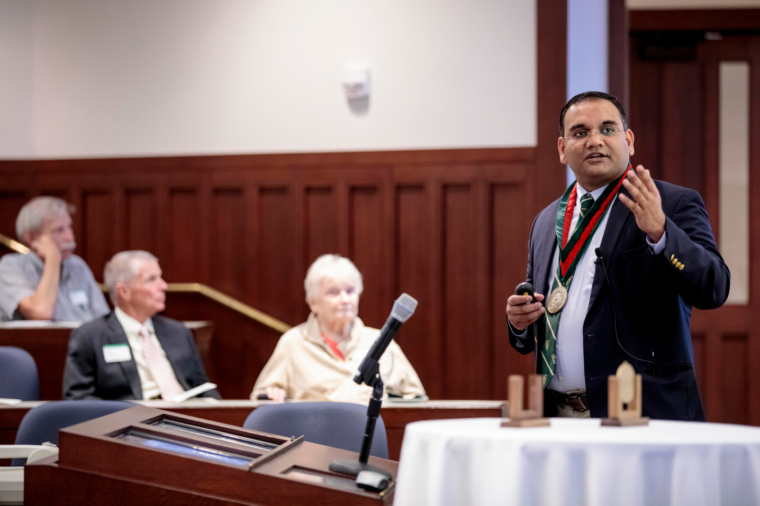Vijay Ramani has been named the inaugural Roma B. and Raymond H. Wittcoff Distinguished University Professor of Environment and Energy at Washington University in St. Louis. He was installed Sept. 13 in a ceremony at the Charles F. Knight Executive Education & Conference Center.
An expert in electrochemical engineering and renewable energy integration, Ramani joined the Department of Energy, Environmental & Chemical Engineering in the School of Engineering & Applied Science at Washington University in 2016 from the Illinois Institute of Technology. His research interests lie at the confluence of electrochemical engineering, materials science and renewable and sustainable energy technologies. Ramani also holds a faculty appointment with the International Center for Energy, Environment and Sustainability (InCEES) at Washington University, and concurrently serves as director of the university’s Center for Solar Energy and Energy Storage.
The endowed position was made possible by a commitment in 2008 from Raymond H. and Roma B. Wittcoff, longtime supporters of Washington University who have given generously of their time, expertise and resources. The Wittcoffs also have long been active in St. Louis civic and cultural affairs.
“I am once again humbled and thankful for the continued generosity exhibited by Roma and Ray Wittcoff, whose exceptional support has benefited countless faculty and students at Washington University,” Chancellor Mark S. Wrighton said. “We are fortunate that they understand the importance of investing in researchers whose work addresses global energy challenges that will make the world better for everyone, and I am delighted that their legacy will be associated with the innovative research of Vijay Ramani.”
“Vijay Ramani’s work has the potential to solve some of the greatest energy crises on the planet,” said Aaron F. Bobick, dean of the School of Engineering & Applied Science and the James M. McKelvey Professor. “The progress that he and his students are making in grid-scale energy storage will allow for broader use of renewable and intermittent energy sources and will have tremendous global impact, particularly in developing countries. We are grateful for the Wittcoffs’ generosity to Washington University to support this research.”
“As the newest endowed professor associated with InCEES, we are excited for Vijay to share his research expertise and experience working with industry leaders with our students, faculty and international partners,” said Himadri B. Pakrasi, the Myron and Sonya Glassberg/Albert and Blanche Greensfelder Distinguished University Professor and director of InCEES.
Since joining the Washington University faculty, Ramani has received two major research grants, including a $2 million grant from the U.S. Department of Energy’s Advanced Research Projects Agency – Energy, to create a new membrane that can be used in batteries for grid-scale electric energy storage. In addition, Ramani received a three-year, $468,087 grant from the Office of Naval Research (ONR) to create a stable, bipolar membrane for fuel-cell propulsion systems that would enable the U.S. Navy’s unmanned undersea vehicles to fulfill challenging mission requirements.
Ramani earned a bachelor’s degree in chemical engineering from Annamalai University and a doctorate in chemical engineering from the University of Connecticut. He has held an extraordinary professorship at North-West University, South Africa; a visiting professorship at Tsinghua University; and an adjunct professorship in chemical engineering at the Indian Institute of Technology-Madras. He has received numerous honors and awards, including a CAREER Award from National Science Foundation and ONR’s Young Investigator Program Award. A member of the Electrochemical Society and of the American Institute of Chemical Engineers, he is co-editor of ECS Interface.
Roma and Raymond Witcoff both are emeritus trustees, and both serve on the School of Medicine National Council. They have helped fund building projects, program initiatives, scholarships and professorships. Washington University honored them with the Robert S. Brookings Award at Founders Day in 1993, and the School of Medicine presented them with the 2nd Century Award in 1995.
Mr. Wittcoff earned a bachelor’s degree from the University of Chicago in 1942, then served as a Navy lieutenant in World War II. After the war, he became president of Transurban Corp., which built, owned, and managed office buildings, and a spokesman on the redevelopment of cities. He chaired the National Citizen’s Committee for Educational Television and the mayor’s committee responsible for bringing KETC/Channel 9 to St. Louis. He also chaired the Human Development Corp., coordinating anti-poverty efforts in the city.
In addition, Mr. Wittcoff chaired the board of directors of Washington University Medical Center and of Jewish Hospital (now Barnes-Jewish Hospital). He was instrumental in inaugurating the Washington University Medical Center Redevelopment Corp. In 1986, he established the Raymond H. Wittcoff Professorship in Biological Chemistry at the School of Medicine.
Both of the Wittcoffs have provided loyal service to the university’s Brown School. Mrs. Wittcoff is an emerita member of the Brown School National Council, and she was awarded the Brown School Dean’s Medal in 1995. She has served on the Alumni Board of Governors and is a life member of the Women’s Society. She is a founding board member of Opera Theatre of St. Louis, past board member of Channel 9, and a member of the National Board of the American Society for Technion. In 1984, she established the Dan Broida Professorship in Operations and Manufacturing Management at Olin Business School in memory of her first husband.

Comments and respectful dialogue are encouraged, but content will be moderated. Please, no personal attacks, obscenity or profanity, selling of commercial products, or endorsements of political candidates or positions. We reserve the right to remove any inappropriate comments. We also cannot address individual medical concerns or provide medical advice in this forum.